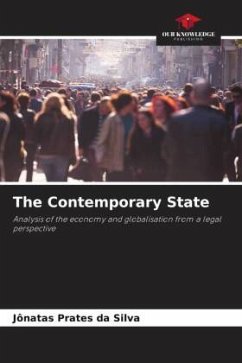Starting from the analysis of theories on the social contract, this work, based on data, information and works of a theoretical and scientific nature, makes a connection with the contemporary State and the influence of Law on the formation and organisation of society. It also studies the origins and exponent theories on economics, as well as their repercussion on government policies and on the notion of collectivism and individualism. The approach involves liberalism, Keynes, neoliberalism, globalisation, taking into account non-intervention and its effects, among other aspects, but which are closely related to law. Finally, the importance and position of law in the organisation and formation of the state and society is studied. It is observed that the Law is essential in the constitution of both, as well as its orientation towards development, and therefore precedes the economy, assisting the State in determining policies and means that provide care for all the individuals that compose it. On the other hand, contemporary law faces new challenges in the face of the relations and expressions of societies in relation to state organisations, in the manifest globalisation.
Bitte wählen Sie Ihr Anliegen aus.
Rechnungen
Retourenschein anfordern
Bestellstatus
Storno








